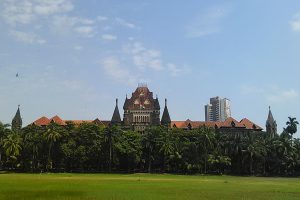Bombay High Court: C.V. Bhadang, J., addressed an application regarding the transfer of Criminal Miscellaneous Application regarding the dissolution of marriage on the ground of cruelty.
Facts pertinent to the matter are that the marriage of husband and wife ran into rough weather and led to the applicant/husband to file for divorce on the ground of cruelty, pending before the Family Court.
Whereas, the respondent/wife filed a case against the applicant for various reliefs under the Protection of Women from Domestic Violence Act, 2005 which also pending before the Magistrate.
Applicant has prayed for the transfer of the said case to Family Court.
Counsels in the present matter: Abhijit D. Sarwate for the Applicant and Arvind Chavan for the Respondent.
Analysis and Decision
Bench noted that the applicant sought relief of the dissolution of marriage and permanent custody of the children. Along with said reliefs, he was also seeking partition of the property situated in Pune. Whereas, the respondent filed a Criminal M.A. under Sections 12, 17, 18, 19, 20, 22 and 23(2) of the D.V. Act seeking a residence order in the above-stated property, protection order and monetary reliefs in the form of monthly maintenance of Rs 1,50, 000 and compensation in the form of one-time lump sum payment of Rs 50 lakhs along with Rs 5 lakhs as costs.
Principle Issue:
Whether the Family Court can entertain the application, as framed and filed by the respondent, before the Magistrate?
To the said issue, Court responded that it has been covered by at least three decisions of the Single Judges :
Minoti Subhash Anand v. Subhash Manoharlal Anand, 2015 SCC OnLine Bom 6113
Sandip Mrinmoy Chakraborty v. Reshita Sandip Chakrabarty, 2018 SCC Online Bom 2709
Santosh Machindra Mulik v. Mohini Mithu Choudhari, Misc. C.A. No. 64 of 2019 decided on 15-11-2019
Bench added that this Court has consistently observed that in view of Section 7(2)(b) of the Family Courts Act read with Section 26 of the D.V. Act that the Family Court would get jurisdiction to entertain an application for relief under Sections 18 to 22 of the D.V. Act.
Respondent’s Counsel pointed that Section 26 of the D.V. Act speaks of the reliefs available under Section 18 to 22 and does not cover Section 17. To which the Court stated that the said contention is misconceived.
Section 17 of D.V. Act declares the right of the aggrieved person to reside in the shared household. The remedy to enforce any such right, is to be found in Section 19, which is included in Section 26 of the said Act.
Further, the Counsel for the respondent submitted that under Section 28(2) of the D.V. Act, the Magistrate is competent to follow his own procedure, which latitude is not available to the family court. Court negatived the said argument in the case of Santosh Machindra Mulik v. Mohini Mithu Choudhari, Misc. C.A. No. 64 of 2019 decided on 15-11-2019 in view of Section 10(3) of the Family Courts.
The decision of Vimlaben Ajitbhai Patel v. Vatslaben Ashokbhai Patel is also misplaced in the present context as in the said decision, Supreme Court held that, under the provisions of the Domestic Violence Act the wife not only acquires a right to be maintained but also acquires a right of residence, which is a higher right. It has been held that such a right of residence extends only to joint properties, in which the husband has a share.
The above-said judgment cannot come to the aid of the respondent.
Hence the Court allowed the application in view of the above.[Hitesh Prakashmalji Mehta v. Aashika Hitesh Mehta, 2020 SCC OnLine Bom 983, decided on 28-09-2020]

